AMD Zen 3 Ryzen Deep Dive Review: 5950X, 5900X, 5800X and 5600X Tested
by Dr. Ian Cutress on November 5, 2020 9:01 AM ESTCPU Tests: Synthetic
Most of the people in our industry have a love/hate relationship when it comes to synthetic tests. On the one hand, they’re often good for quick summaries of performance and are easy to use, but most of the time the tests aren’t related to any real software. Synthetic tests are often very good at burrowing down to a specific set of instructions and maximizing the performance out of those. Due to requests from a number of our readers, we have the following synthetic tests.
Linux OpenSSL Speed: SHA256
One of our readers reached out in early 2020 and stated that he was interested in looking at OpenSSL hashing rates in Linux. Luckily OpenSSL in Linux has a function called ‘speed’ that allows the user to determine how fast the system is for any given hashing algorithm, as well as signing and verifying messages.
OpenSSL offers a lot of algorithms to choose from, and based on a quick Twitter poll, we narrowed it down to the following:
- rsa2048 sign and rsa2048 verify
- sha256 at 8K block size
- md5 at 8K block size
For each of these tests, we run them in single thread and multithreaded mode. All the graphs are in our benchmark database, Bench, and we use the sha256 and md5 results in published reviews.
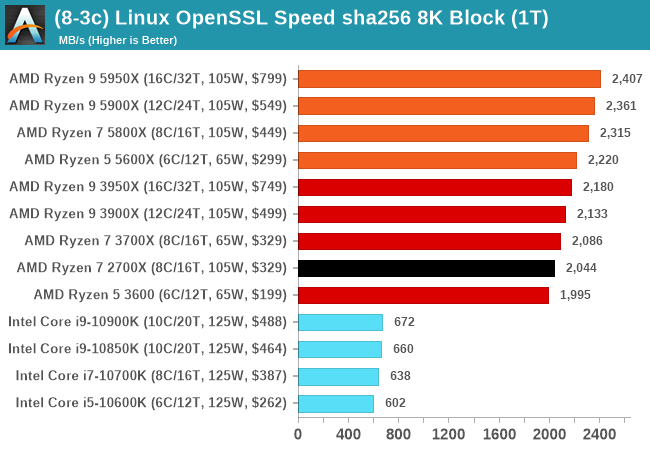
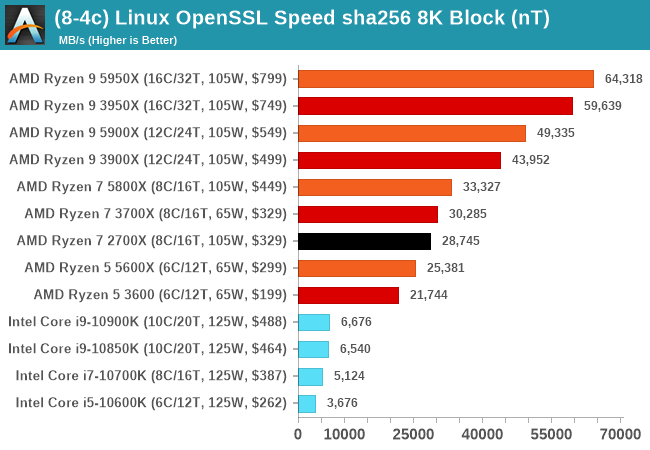
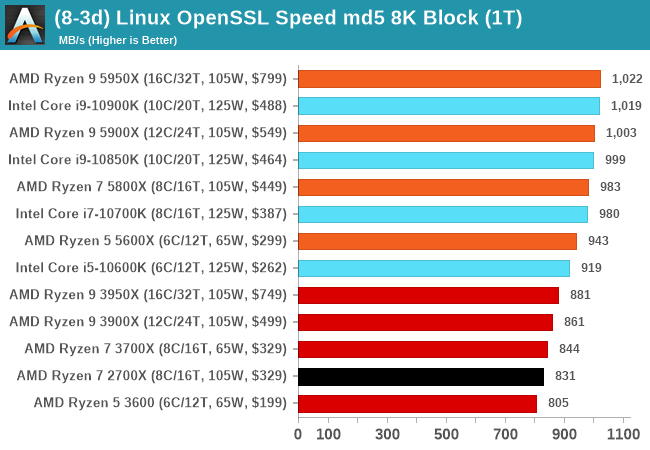
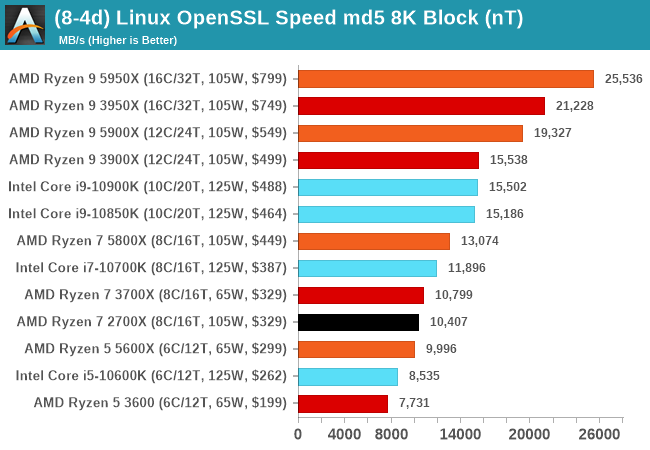
GeekBench 5: Link
As a common tool for cross-platform testing between mobile, PC, and Mac, GeekBench is an ultimate exercise in synthetic testing across a range of algorithms looking for peak throughput. Tests include encryption, compression, fast Fourier transform, memory operations, n-body physics, matrix operations, histogram manipulation, and HTML parsing.
I’m including this test due to popular demand, although the results do come across as overly synthetic, and a lot of users often put a lot of weight behind the test due to the fact that it is compiled across different platforms (although with different compilers).
We have both GB5 and GB4 results in our benchmark database. GB5 was introduced to our test suite after already having tested ~25 CPUs, and so the results are a little sporadic by comparison. These spots will be filled in when we retest any of the CPUs.
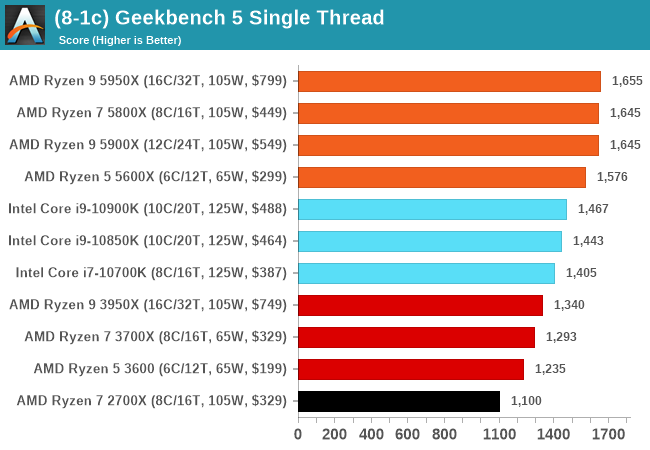
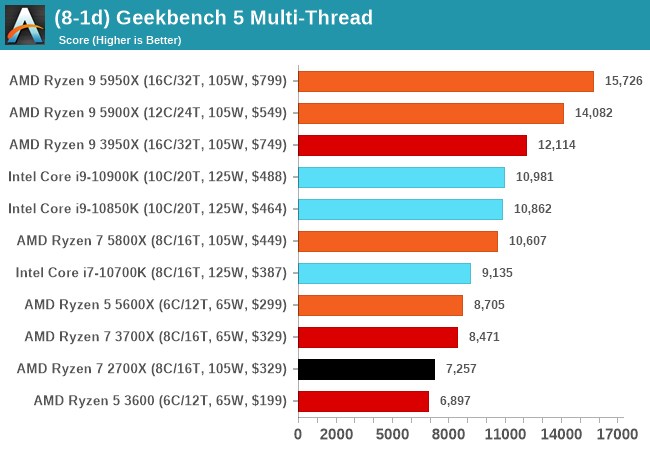










339 Comments
View All Comments
Qasar - Sunday, November 8, 2020 - link
or PEBCAK :-)Qasar - Sunday, November 8, 2020 - link
ug.... PEBKACSpunjji - Monday, November 9, 2020 - link
It works both ways! :DSlash3 - Saturday, November 7, 2020 - link
The only real snag is for Ryzen/TR users wanting to install on a RAID volume, as doing so requires loading three individual drivers not provided by the Windows boot media (RCBottom, RCRAID, RCCFG). Without these the drives won't be visible, where with Intel's RST they will be visible without additional steps.It's not a common configuration for regular users, but worth mentioning as it's not always obvious and nobody reads instructions these days.
Tomatotech - Monday, November 9, 2020 - link
Friends don’t let friends install boot OSes on RAID disks. Anything goes wrong, dead drive etc, you’re fucked.Often the specific repair tools required to repair the RAID are on the OS partition that you need to access before repairing the RAID, but you can’t access it until you’ve repaired the RAID... and round and round you go.
Seen it happen at a couple of businesses that hired shitty IT consultants.
Spunjji - Monday, November 9, 2020 - link
Yup. Only ever worth doing on servers that have a RAID-aware BIOS and, ideally, some sort of integrated lifecycle controller with the drivers available.On a consumer-grade desktop system (i.e. not workstation) there is less than no point.
dagobah123 - Friday, November 6, 2020 - link
These are not meant to be CPUs with on-board (integrated) GPUs. AMD has those, they are APUs e.g. 3400G, 3750G). The 5000 series APUs will come next year. Also, as other have stated above there's no difference in setting up an AMD vs. Intel system. Microsoft includes the drivers you need to get going, but of course with any build do update them once you're up and running. I've had both 10+ Intel and AMD systems over the years and certainly no stability issues ever related to the CPU, Intel or AMD.Kent T - Friday, November 6, 2020 - link
There seem to be something wrong in the GIMP app opening chart. Can it really be, that all the biggest and most expensive CPU's are the absolute slowest at more than half a minute? And besides that, I have a 3770 non-K, and on Linux Mint 20 it takes a little less than 3 seconds to open GIMP 2.10. Except the first time after installing, it took 8 seconds.supdawgwtfd - Friday, November 6, 2020 - link
Read the article. The answer is right thereKent T - Friday, November 6, 2020 - link
Yeah, just saw it, my bad